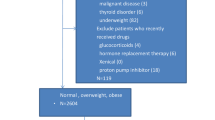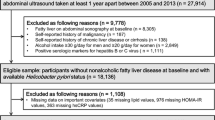Abstract
Purpose of Review
To determine if there is a relationship between Helicobacter pylori (H. pylori) and metabolic disorders such as obesity, metabolic syndrome, and nonalcoholic fatty liver disease.
Recent Findings
H. pylori is a bacterium that affects almost 50% of the world population. New information shows that it may have a relationship with metabolic disorders. This relationship might be induced by regulation of adipokines and hormones, chronic inflammation, and insulin resistance. Contrasting, there has been reported weight gain after the eradication treatment.
Summary
There is a strong relationship between H. pylori and nonalcoholic fatty liver disease (NAFLD), a less obvious relationship with obesity, and probably no relationship with metabolic syndrome. H. pylori–positive patients should be screened for obesity at the time of diagnosis. Eradication treatment must be done to avoid medical complications, and weight gain should be monitored. Early treatment of H. pylori infection may reduce the risk of NAFLD. Future studies should investigate a causal relationship between H. pylori and metabolic disorders.
Similar content being viewed by others
References
Papers of particular interest, published recently, have been highlighted as: • Of importance •• Of major importance
Abo-Amer YEE, Sabal A, Ahmed R, Hasan NFE, Refaie R, Mostafa SM, et al. Relationship between helicobacter pylori infection and nonalcoholic fatty liver disease (Nafld) in a developing country: a cross-sectional study. Diabetes, Metab Syndr Obes Targets Ther. 2020;13:619–25.
Alzahrani S, Nelson J, Moss SF, Paulus JK, Knowler WC, Pittas AG. H. pylori seroprevalence and risk of diabetes: an ancillary case–control study nested in the diabetes prevention program. J Diabetes Complications [Internet]. 2017;31(10):1515–20. https://doi.org/10.1016/j.jdiacomp.2017.05.015.
Dhurandhar NV, Bailey D, Thomas D. Interaction of obesity and infections. Obes Rev. 2015;16(12):1017–29.
Liu R, Liu Q, He Y, Shi W, Xu Q, Yuan Q, et al. Association between Helicobacter pylori infection and nonalcoholic fatty liver: a meta-analysis. Medicine. 2019;98(44):e17781.
• Mantovani A, Turino T, Altomari A, Lonardo A, Zoppini G, Valenti L, et al. Association between Helicobacter pylori infection and risk of nonalcoholic fatty liver disease: an updated meta-analysis. Metabolism [Internet]. 2019;96(2019):56–65. https://doi.org/10.1016/j.metabol.2019.04.012Mantovani A et al. conducted this meta-analysis that concluded that H. pylori infection is associated with mildly increased risk of prevalence and incidence of NAFLD in middle-aged individuals. They have a large number of individuals with H. pylori infection and NAFLD that provide high statistical information.
Zamani M, Ebrahimtabar F, Zamani V, Miller WH, Alizadeh-Navaei R, Shokri-Shirvani J, et al. Systematic review with meta-analysis: the worldwide prevalence of Helicobacter pylori infection. Aliment Pharmacol Ther. 2018;47(7):868–76.
Vafaeimanesh J, Bagherzadeh M, Mirzaei A, Parham M, Norouzinia M, Vafaee R. Effect of Helicobacter pylori on metabolic syndrome parameters in diabetic patients. Gastroenterol Hepatol from Bed to Bench. 2016;9(1):S36–41.
The GBD. 2015 Obesity Collaborators. Health effects of overweight and obesity in 195 countries over 25 years. N Engl J Med. 2017;377(1):13–27.
World Health Organization. Obesity and overweight [Internet]. 2020 [cited 2021 Mar 14]. Available from: https://www.who.int/news-room/fact-sheets/detail/obesity-and-overweight
Saklayen MG. The global epidemic of the metabolic syndrome. Curr Hypertens Rep. 2018;20(2):1–8.
Kountouras J, Polyzos SA, Doulberis M, Zeglinas C, Artemaki F, Vardaka E, et al. Potential impact of Helicobacter pylori-related metabolic syndrome on upper and lower gastrointestinal tract oncogenesis. Metabolism [Internet]. 2018;87(2018):18–24. https://doi.org/10.1016/j.metabol.2018.06.008.
Mokhtare M, Mirfakhraee H, Arshad M, Samadani Fard SH, Bahardoust M, Movahed A, et al. The effects of helicobacter pylori eradication on modification of metabolic syndrome parameters in patients with functional dyspepsia. Diabetes Metab Syndr Clin Res Rev [Internet]. 2017;11(2017):S1031–5. https://doi.org/10.1016/j.dsx.2017.07.035.
Swarup S, Goyal A, Grigorova Y, Zeltser R. Metabolic Syndrome [Internet]. StatPearls Treasure. StatPearls Publishing.; 2021 [cited 2021 Mar 14]. Available from: http://www.ncbi.nlm.nih.gov/pubmed/29083742
Cheng DD, He C, Ai HH, Huang Y, Lu NH. The possible role of Helicobacter pylori infection in non-alcoholic fatty liver disease. Front Microbiol. 2017;8(MAY).
•• Doulberis M, Srivastava S, Polyzos SA, Kountouras J, Papaefthymiou A, Klukowska-Rötzler J, et al. Active Helicobacter pylori infection is independently associated with nonalcoholic steatohepatitis in morbidly obese patients. J Clin Med. 2020;9(4):933 Doulberis M et al. study shows an association between H. pylori infection and severity of NAFLD in morbidly obese patients; this is one of the minimum studies that use the gold standard for diagnosis of both variables of interest, H. pylori and NAFLD.
Fazel Y, Koenig AB, Sayiner M, Goodman ZD, Younossi ZM. Epidemiology and natural history of non-alcoholic fatty liver disease. Metabolism [Internet]. 2016;65(8):–1017, 25. https://doi.org/10.1016/j.metabol.2016.01.012.
• Al-Zubaidi AM, Alzobydi AH, Alsareii SA, Al-Shahrani A, Alzaman N, Kassim S. Body mass index and helicobacter pylori among obese and non-obese patients in najran, Saudi Arabia: a case-control study. Int J Environ Res Public Health. 2018;15(11):1–8 Al-Zubaidi AM et al. conducted the first case-control study in Najran SA and considered non-modifiable factors as age and gender in the relationship between obesity and H. pylori.
•• Chen LW, Kuo SF, Chen CH, Chien CH, Lin CL, Chien RN. A community-based study on the association between Helicobacter pylori Infection and obesity. Sci Rep. 2018;8(1):1–10 Chen LWet al. evaluate the association between H. pylori infection and overweight/obesity; they found that H. pylori–positive patients with age less than 50 years may increase the risk of obesity.
Suki M, Leibovici Weissman Y, Boltin D, Itskoviz D, Tsadok Perets T, Comaneshter D, et al. Helicobacter pylori infection is positively associated with an increased BMI, irrespective of socioeconomic status and other confounders: A cohort study. Eur J Gastroenterol Hepatol. 2017;30(2):143–8.
Xu MY, Liu L, Yuan BS, Yin J, Lu Q. Bin. Association of obesity with Helicobacter pylori infection: a retrospective study. World J Gastroenterol. 2017;23(15):2750–6.
•• Xu X, Li W, Qin L, Yang W, Yu G, Wei Q. Relationship between Helicobacter pylori infection and obesity in Chinese adults: a systematic review with meta-analysis. PLoS One [Internet]. 2019;14(9):1–13. https://doi.org/10.1371/journal.pone.0221076Xu X et al. describe the association between H. pylori infection and obesity; they concluded that H. pylori infection may be one of the risk factors for obesity. This is the first systematic review and meta-analysis about the relationship in China.
Roca-Rodríguez MM, Coín-Aragüez L, Cornejo-Pareja I, Alcaide J, Clu-Fernández C, Muñoz-Garach A, et al. Carbohydrate metabolism improvement after Helicobacter pylori eradication. Diabetes Metab. 2016;42(2):130–4.
Upala S, Sanguankeo A, Saleem SA, Jaruvongvanich V. Effects of Helicobacter pylori eradication on insulin resistance and metabolic parameters: a systematic review and meta-analysis. Eur J Gastroenterol Hepatol. 2017;29(2):153–9.
Hirabayashi M, Inoue M, Sawada N, Saito E, Abe SK, Hidaka A, et al. Effect of body-mass index on the risk of gastric cancer: a population-based cohort study in A Japanese population. Cancer Epidemiol [Internet]. 2019;63(May 2019):101622. https://doi.org/10.1016/j.canep.2019.101622.
Cornejo-Pareja I, Martín-Núñez G, Roca-Rodríguez M, Cardona F, Coin-Aragüez L, Sánchez-Alcoholado L, et al. H. pylori eradication treatment alters gut microbiota and GLP-1 secretion in humans. J Clin Med. 2019;8(4):451.
Nauck MA, Meier JJ. Incretin hormones: their role in health and disease. Diabetes, Obes Metab. 2018;20(October 2017):5–21.
Jialiang C, Jie M, Xinyuan L, Shaojie D, Ning L. The association between Helicobacter pylori infection infection with overweight/obesity. A protocol for a systematic review and meta-analysis of observational studies. Medicine. 2020;99(3):0–0.
Malfertheiner P, Megraud F, O’Morain C, Gisbert JP, Kuipers EJ, Axon A, et al. Management of helicobacter pylori infection-the Maastricht V/Florence consensus report. Gut. 2017;66(1):6–30.
Wawro N, Amann U, Butt J, Meisinger C, Akmatov MK, Pessler F, et al. Helicobacter pylori seropositivity: prevalence, associations and the impact on incident metabolic diseases/risk factors in the population-based KORA study. Front Public Heal. 2019;7(APR):1–8.
Author information
Authors and Affiliations
Corresponding author
Ethics declarations
Conflict of Interest
The authors declare no competing interests.
Human and Animal Rights and Informed Consent
This article does not contain any studies with human or animal subjects performed by any of the authors.
Additional information
Publisher’s Note
Springer Nature remains neutral with regard to jurisdictional claims in published maps and institutional affiliations.
This article is part of the Topical Collection on Metabolism in Tropical Medicine
Rights and permissions
About this article
Cite this article
Hernandez Lemus, R., Hernandez Monroy, A. Is There Any Relationship Between Helicobacter pylori and Obesity, Metabolic Syndrome, and Non-alcoholic Fatty Liver Disease?. Curr Trop Med Rep 8, 212–217 (2021). https://doi.org/10.1007/s40475-021-00240-7
Accepted:
Published:
Issue Date:
DOI: https://doi.org/10.1007/s40475-021-00240-7




